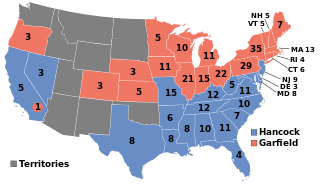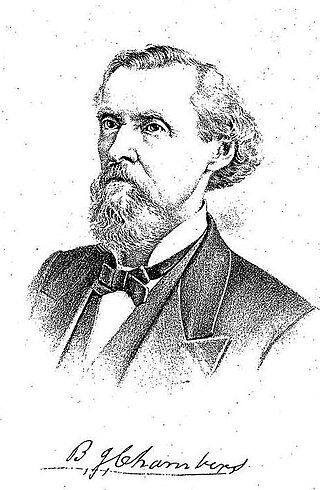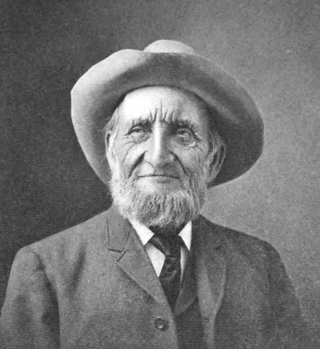
Presidential elections were held in the United States on November 2, 1880. Republican nominee James A. Garfield defeated Winfield Scott Hancock of the Democratic Party. The voter turnout rate was one of the highest in the nation's history. Garfield was assassinated during his first year in office, and he was succeeded by his vice president, Chester A. Arthur.

James Baird Weaver was an American politician in Iowa who was a member of the United States House of Representatives and two-time candidate for President of the United States. He belonged to several different political parties over the course of his political career. He joined the Republicans, opposed slavery, and served as an officer in the Union army during the civil war, but after 1876 he switched to the Greenbacks, then the Populists, and finally the Democrats. He trained as a lawyer. Late in his career he served as mayor of Colfax, Iowa. He wrote k, A Call to Action: An Interpretation of the Great Uprising, Its Source and Causes published in 1892 when he was a Populist Party candidate for the U.S. presidency, he later wrote a history of Jasper County, Iowa.

Alvin Hawkins was an American jurist and politician. He served as the 22nd Governor of Tennessee from 1881 to 1883, one of just three Republicans to hold this position from the end of Reconstruction to the latter half of the 20th century. Hawkins was also a judge on the Tennessee Supreme Court in the late 1860s, and was briefly the U.S. consul to Havana, Cuba, in 1868.

The 1880 South Carolina gubernatorial election was held on November 2, 1880 to s elect the governor of South Carolina. Johnson Hagood was nominated by the Democrats and ran against L. W. R. Blair, a Greenback-Labor candidate. Hagood easily won the general election and became the 80th governor of South Carolina.

The 1882 South Carolina gubernatorial election was held on November 7, 1882 to select the governor of the state of South Carolina. Hugh Smith Thompson was nominated by the Democrats and ran against J. Hendrix McLane, a Greenback-Labor candidate. Thompson easily won the general election and became the 81st governor of South Carolina.

Harris Merrill Plaisted was an attorney, politician, and Union Army officer from Maine. As colonel, he commanded the 11th Maine Volunteer Infantry Regiment during the American Civil War. After the war, he served as Maine Attorney General, a U.S. Congressman, and the 38th Governor of Maine.
The 1880 Democratic National Convention was held June 22 to 24, 1880, at the Music Hall in Cincinnati, Ohio, and nominated Winfield S. Hancock of Pennsylvania for president and William H. English of Indiana for vice president in the United States presidential election of 1880.

Barzillai Jefferson Chambers was an American surveyor, lawyer, and politician of the Gilded Age. Born in Kentucky, he moved to Texas to join its war for independence against Mexico. Chambers stayed in Texas after its independence and annexation by the United States, earning a living as a surveyor and farmer in Johnson County. In the American Civil War, he served briefly in the Confederate army, then returned to his farming and business interests, becoming part-owner of a bank in his hometown of Cleburne.

Daniel Franklin Davis was an American politician and the 37th Governor of Maine.
The following table indicates the party of elected officials in the U.S. state of Maine:

The 1880 Greenback Party National Convention convened in Chicago from June 9 to June 11 to select presidential and vice presidential nominees and write a party platform for the Greenback Party in the United States presidential election 1880. Delegates chose James B. Weaver of Iowa for President and Barzillai J. Chambers of Texas for Vice President.

Solon Chase was an American farmer, orchardist, politician and newspaper publisher from Maine. Chase served two single year terms in the Maine House of Representatives. In 1873, an economic depression began and Chase joined the national Greenback Party. He is credited with founding the Greenback Party in Maine. Chase sought to build an independent movement of farmers and workers through the Greenback Party and opposed electoral fusion with the Maine Democratic Party.

The 1964 United States presidential election in Maine took place on November 3, 1964, as part of the 1964 United States presidential election, which was held throughout all fifty states and D.C. Voters chose four representatives, or electors to the Electoral College, who voted for president and vice president.

The 1878 Massachusetts gubernatorial election was held on November 5. Former acting Governor Thomas Talbot, a Republican, defeated Benjamin Butler, who ran as an independent Greenback candidate with Democratic support. Butler's supporters secured a majority of delegates to the Democratic state convention, but his nomination was rejected by the state party committee after his supporters used violent tactics to exclude anti-Butler delegates from the convention hall.

The 1879 Massachusetts gubernatorial election was held on November 4.

The 1880 Prohibition Party National Convention convened in Halle's Hall in Cleveland, Ohio on June 17, 1880 to select presidential and vice presidential nominees for the 1880 United States presidential election. Delegates unanimously chose Neal Dow of Maine for President and Henry Adams Thompson of Ohio for Vice President. They were both nominated by a founder of the party, James Black. Dow and Thompson left the convention as the party's nominees, but in the end, they lost. The election was a close contest between the Republican, James A. Garfield, and the Democrat, Winfield Scott Hancock, with Garfield being the victor. The Prohibition Party placed a distant fourth, netting just over 0.1% of the popular vote.

The 1880 United States presidential election in Kentucky took place on November 2, 1880. All contemporary thirty-eight states were part of the 1880 United States presidential election. Kentucky voters chose twelve electors to the Electoral College, which selected the president and vice president.

The 1910 Maine gubernatorial election took place on September 12, 1910.

The 1880 Tennessee gubernatorial election was held on November 2, 1880, to elect the next governor of Tennessee. Incumbent Democratic governor Albert S. Marks did not seek re-election. Republican candidate Alvin Hawkins won the election with 42.57% of the vote.


















